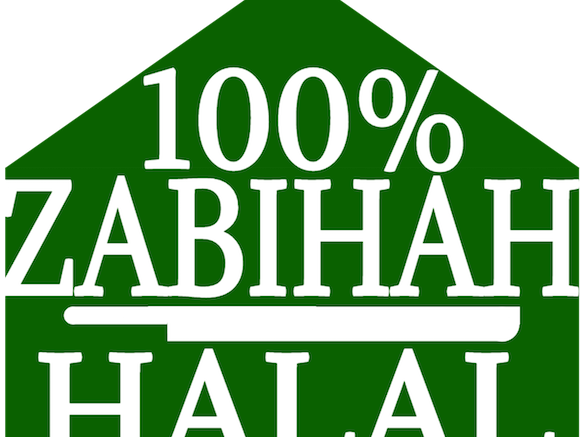Zabah is the act of slaying an animal
Introduction: Zabah is the act of slaying an animal in accordance with the Shariah (Islamic Law) so that it becomes halal (permissible) for eating. Zabah is an embodiment of Muslim conception of food hygiene and humaneness towards animals. This conception is based on what Allah revealed through His prophets from Adam to Muhammad [peace be upon them]. Muhammad, under divine guidance, edified to perfection the principles taught :by his predecessors – Jesus, Moses and Ibraheem, [peace be upon them].
Zabah is different from every form of killing animals practiced in the West. As opposed to slaughter, Zabah is a Divinely ordained method with rules and regulations.
Zabah is anesthesia as we understand anesthesia today, as opposed to stunning, the primitive form of anesthesia man practiced years ago and which has since been abandoned. The modern so-called ‘humane killers’ are merely mechanized forms of stunning introduced to ensure a high output for the mechanized meat packing. industry.
FUNDAMENTAL PRINCIPLES
Allah says in the Qur’an: “Forbidden for you are carrion, and blood, and flesh of swine, and that which has been slaughtered while proclaiming the name of any other than God, and one killed by strangling, and one killed with blunt weapons, and one which died by falling, and that which was gored by the horns of some animal, and one eaten by a wild beast, except those whom you slaughter; and that which is slaughtered at the altar and that which is distributed by the throwing of arrows [for an omen]; this is an act of sin.” Qur’an 5-3
It is clear from the above that animals dying naturally and/or accidentally from any of the accidents enumerated above are unlawful unless killed.before they are dead. They are purified by draining:away the (impure) blood
Naturally death can be agonizing and death from the accidental injuries enumerated above is certainly agonizing. The agony suffered by the animal is terminated by rendering it insensitive to.pain.by bleeding it.
Faith in Allah and the accountability before Him in the Hereafter are the greatest deterrent to cruelty and the method of Zabah is the requisite for humane disposal of animals.
THE METHOD
For the lawful animals, except camels, Zabah consists of horizontally cutting the vessels in the. neck of the animal, anywhere between the throat and the head the chest-bone by a sharp object The four vessels which must cut are:
1. The gullet (the passage through which food and drink go into the stomach).
2 The windpipe (the passage through which breath passes).
3. The two external jugular veins (the two main veins on either side of the wind pipe).
Before the fatal incision is made the slayer has to pronounce the phrase Bismillah – in the name of Allah.
Zabah is of two kinds: 1. Ikhteari or by choice – that is voluntary or at pleasure, and is effected by cutting the throat above the breast.
2 .Iztiraree:- that is at random due to necessity and. may be effected by a.wound on any part of the animal’s body.. The latter kind is merely a substitute for the former and accordingly is not valid unless the former is impracticable as for example, when the animal has been wounded by any of the accidents enumerated previously and must be killed quickly. The former, however is more effective in extracting blood and is more humane.
ABOMINABLE ACTS IN ZABAH
It is abominable to:
1. First throw the animal down on its side and then sharpen the knife
2. Let the knife reach the spinal marrow or to cut off the head of the animal
3. Break the neck of the animal while it is convulsing,
4. Slay the animal by first cutting in the back.
The most eligible method of slaying a camel is by Nahre, that is, spearing it in the hollow of the throat.
WHO CAN PERFORM THE ZABAH
Zabah must be performed by a Muslim or follower of the Torah or Injeel whether man, woman, minor or feeble-minded. The slayer must however be acquainted with the following:
a. What is said before proceeding (Bismillah – in the name of Allah)
b. The nature of Zabah
c. The nature of cutting across the neck
It is not possible that zabah to be performed by a Magian, apostate or an idolator.
DRAINING OF BLOOD
Consumption:of blood is prohibited by.Allah. Some of the reasons for this prohibition can be.easily understood. Blood carries waste products of tissue metabolism that are harmful to the body and these are separated from the blood in the kidney.
Blood also carries organism of disease and in what is.known as sub-clinical infection, organism may be present in the blood without the body manifesting any of the symptoms of the disease. Thus, it is hygienic to extract as much blood as is physiologically possible and Zabah accomplishes this.
PAIN IN ZABAH
To know if the animal feels pain we have to consider the effects of 1. cut on the neck, 2. bleeding and 3. convulsions.
1. Cut on the neck: It is generally known that we do not perceive accidentally cutting ourselves during shaving with a sharp blade until after when the bleeding draws our attention to it. Similarly, the quick cut on the skin of the animal should be imperceptible while being inflicted. It is essential that the knife used should be sharp to minimize the time and effort and hence pain to the animal when cutting the skin. A horizontal incision is more appropriate for severing the vertically running blood vessels and is less painful than a vertical incision.
The above assessment assumes that animals are as sensitive to pain as man but that is not the case as they are more thick skinned and hence less sensitive to pain.
2. Bleeding: This is not painful. If it were very few would be prepared to donate blood.
3. Convulsion: The rhythmic movements of the body of the animal are known as.convulsions. When the animal is cut by the method of Zabah, it loses so .much blood so quickly that .it faints and the sensation of pain in the sensory centre of the animal’s brain stops. Convulsions are essential for wringing .the meat of blood and do not occur if the spinal cord is cut. Cutting the spinal cord is painful as well. Hence :the cutting of the spinal.cord or breaking of the neck is abominable.
TECHNIQUE OF.ZABAH
Guidance for Muslims in Zabah was laid down 1400 years ago by Muhammad [peace be upon him], when he said:
“Allah has ordained kindness in every act. If you must slay an animal.do it in the best possible manner. Everyone of you must sharpen his knife before slaying the animal, comfort it, feed it and give it water and rest.”
MODERN METHODS OF SLAUGHTER COMPARED WITH ZABAH
All have agreed on the necessity for bleeding the animal by severing the blood vessels, for improving the taste and keeping the quality of the meat. The controversy however, since the introduction of mechanized killers and the mechanization of the meat industry has been whether or not the animal.should be stunned before bleeding.
All methods of stunning, whether mechanical (e.g. the pistol), electrical,or by gas (carbon dioxide), produce neurogenic shock, a condition in which blood leaves the circulation. Zabah, on the other hand, produces hemorrhagic shock in which all the fluid blood is withdrawn from tissues into the circulation and escapes through the cut blood vessels of the animal.
SUMMARY
There has been considerable scientific advancement from the primitive methods of stunning.used for humans:to modern methods of anesthetizing but while humans are anesthetized before surgery, the animals are still stunned before killing.
Advances in anesthesia cannot be applied to the animal in their present form nor.is there any desire to apply them because of the cost implications. If: the hygienic considerations were solved, then Muslims would have no objection: in. anesthetizing the animals before bleeding. If the object is humaneness to the animal then in the final analysis, using the knife to produce severe bleeding remains the only humane method of killing the animal for food.
Zabah provides bloodless (hence hygienic) meat in an humane manner which is in accordance with the Divine Will. Modern scientific methods can be applied in facilitating the mechanics of Zabah, for example, transportation of animals, provision of food, water and rest for the animals, manufacturing of sharp knives and preservation and storage of the meat.
As published in The Muslim Standard, November 1977




Be the first to comment on "Zabihah: The prescribed and humane method of slaughtering animals"